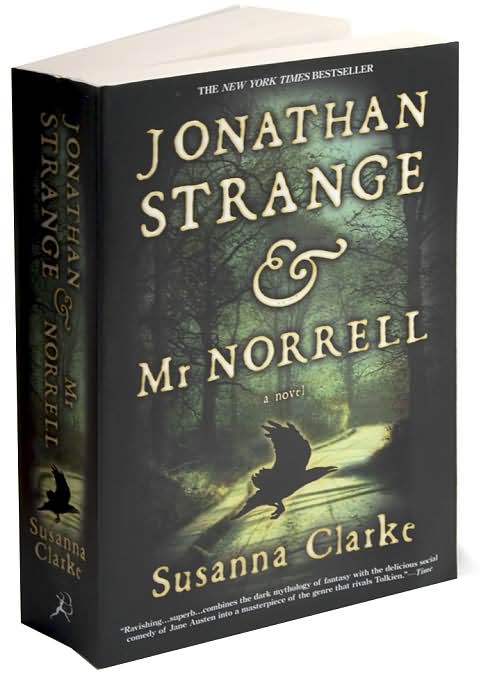
In the April issue of TOUCHSTONE, Franklin Freeman writes about this wonderful book. As I agree with him — and, myself, mentioned the book here last year — I’m again recommending it. Perfect for beach, bedtime, or campfire reading.
Franklin writes: “Anyone who likes the writings of the Inklings will love this book.”
Here’s a reposting from 2005 …
Anyone who has ever borrowed one of my books knows that they are usually heavily marked. Pencil scribblings in side margins indicate favorite passages, notes, etc. I rarely do that with fiction. I did with Jane Eyre; I will next time I read Gone With the Wind … I wish I had with Jonathan Strange and Mr Norrell.
This book, hefty for sure (846 pages), is about the restoration of magic in 19th century England — magic which coexists, in harmony, with the church. It really is a fascinating read and shall now sit on the shelf I have reserved for bright lights such as O’Conner, O. Henry, Goethe, Thoreau, Kafka, Dostoevsky, and the like.
Some samples …
Aunt Greysteel, Bonifazia and Minichello were all at the window and saw how the first stroke of lightning turned the whole familiar scene into something quite Gothic and disturbing, full of pallid, unearthly glare and unexpected shadows. This was followed by a crack of thunder that shook the whole room. Bonifazia murmured appeals to the Virgin and several saints. Aunt Greysteel, who was equally alarmed, might well have been glad of the same refuge, but as a member of the Church of England, she could only exclaim, “Dear me!” and, “Upon my word!” and “Lord bless me!” — none of which gave her much comfort (p.732).
“All I can tell you is this. Before this peculiar obsession with his dead wife, he was full of quite another matter: John Uskglass. You must have observed that? Now I know very little of English magicians. They have always seemed to me a parcel of dull, dusty old men — except for John Uskglass. He is quite another matter! The magician who tamed the Outlanders! The only magician to defeat Death! The magician whom Lucifer himself was forced to treat as an equal! Now, whenever Strange compares himself to this sublime being — as he must from time to time — he see himself for what he truly is: a plodding, earth-bound mediocrity! All his achievements — so praised up in the desolate little isle — crumble to dust before him! That will bring on as fine a bout of despair as you could wish to see. This is to be mortal, And seek the things beyond mortality.” Lord Byron paused for a moment, as if committing the last remark to memory in case he should want to put it in a poem. “I myself was touched with something of the same melancholia when I was in the Swiss mountains in September. I wandered about, hearing avalanches every five minutes — as if God was bent on my destruction! I was full of regrets and immortal longings. Several times I was sorely tempted to blow my brains out — and I would have done it too, but for the recollections of the pleasure it would give my mother-in-law” (p.693).
This passage on CATS:
Dr Greysteel said, “The Jewish gentleman — who seems a very charitable old person — provides her with a place to live, and his servants put dishes of food for her at the foot of the stairs.”
“But as to how the food is conveyed to her,” exclaimed Miss Greysteel, “no one knows for certain. Signor Tosetti believes that her cats carry it up to her.”
“Such nonsense!” declared Dr Greysteel. “Whoever heard of cats doing anything useful!”
“Except for staring at one in a supercilious manner,” said Strange. “That has a sort of moral usefulness, I suppose, in making one feel uncomfortable and encouraging sober reflection upon one’s imperfections” (pp.635-636).
One of the curious glories of the book is the use of footnotes — some quite long, stories in themselves. One footnote, which recounts a fabulous tale, is five pages long. Susanna Clarke inserts numerous — fictional — notes to bolster her story. Here’s two concerning magical spells:
Daedalus’s Rose: a fairly complicated procedure devised by Martin Pale for preserving emotions, vices and virtues in amber and honey or beeswax. When the preserving medium is warmed, the imprisoned qualities are released. The Rose has — or rather had — a huge number of applications. It could be used to disperse nobility of purpose, anger, jealousy, ambition, self-sacrifice, etc., etc.
[Unrobed Ladies:] Like many spells with unusual names, the Unrobed Ladies was a great deal less exciting than it sounded. The ladies of the title were only a kind of woodland flower which was used in a spell to bind a fairy’s powers. The flower was required to be stripped of leaves and petals — hence the “unrobing” (p.753).
If you read it, I’d love to hear from you.











